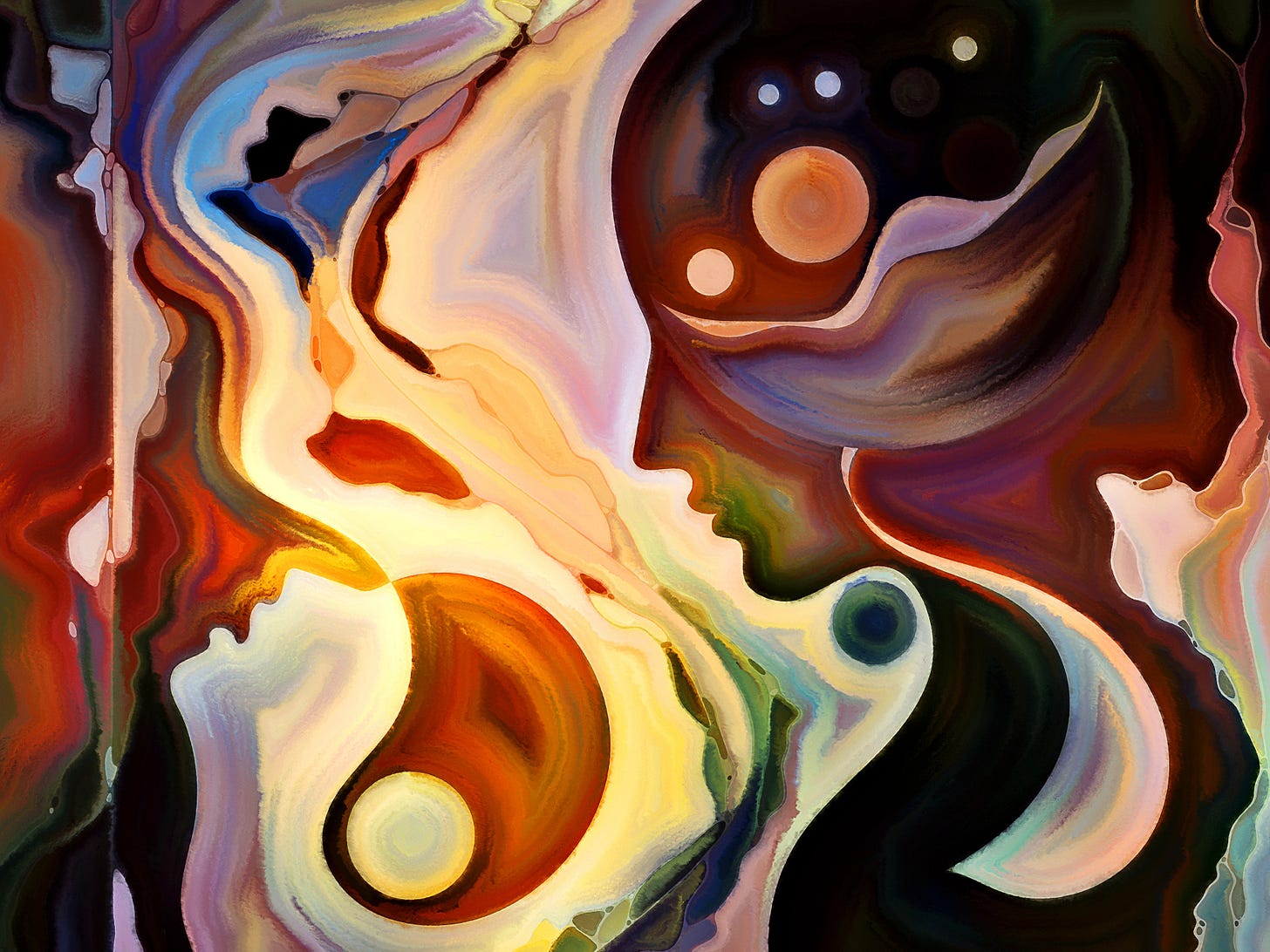Beyond the Noise: Embracing Awareness on your Path to Healing
How tuning in to your inner world can transform grief, stress, and disconnection.
Last year, when I took a month off from Facebook as my sober version of Dry January, I eagerly anticipated a month of creativity. That was what happened the last time I did this—when I emerged with a spontaneously written book! With at least five different book ideas swirling in my mind, I was certain that, in the absence of Facebook’s ever-present lure, one of them might finally emerge.
Oh, foolish, naïve child that I was.
In the absence of the scroll, there was no flurry of creativity. What revealed itself was far more painful.
A few days into my self-imposed social media exile, I erupted in rage at my son’s new phone, frustrated that I couldn’t add his Apple account to our Apple Music plan. I threw his phone onto the sofa, stormed to my bedroom, and surrendered to full-body sobs for fifteen minutes. My son cautiously entered the room and, in his quietest, most anxious voice, whispered, “Mum, I don’t know what I did, but I’m sorry.” The tears and guilt that followed led me downstairs, where I took out the antidepressants I’d stopped a year prior and swallowed one.
The next few days were spent mostly in bed, exhaustion overtaking me, with sadness leaking from my face seemingly without reason. But, of course, there were plenty of reasons. Creating the space to stop distracting myself forced me to confront the truth about my mental health.
In A New Earth: Awakening to Your Life's Purpose, Eckhart Tolle writes, “Awareness is the greatest agent for change.” Without awareness of a problem, we can’t begin to make the changes needed to resolve it. If you don’t know your car has an issue, you won’t take it to the mechanic. The same is true for our emotional lives. Without awareness of how stressed, anxious, or unhappy you are, we cannot take steps to heal and change your life.
While it may seem obvious that we should know how we feel, the reality is often more complex. Many of us have had our emotions dismissed as children, being taught that crying is weak or shameful. You may have experienced trauma and learned to shut down painful emotions to survive. Modern life compounds this disconnection, with endless distractions like social media providing a convenient escape from emotional discomfort.
Last week, I talked about the wisdom of our emotions. How they signal what’s missing, what’s wrong, or what needs to change. But emotions can be overwhelming, and when faced with them, it’s tempting to retreat into behaviours that dull their edge. These coping mechanisms can feel like self-preservation. The brain perceives painful emotions as dangerous. Over time, these avoidance patterns become default coping strategies.
The problem is, emotions don’t disappear when ignored. They remain in the body, manifesting as physical and mental health issues if left unaddressed. This was the painful lesson I was learning. Over the past four years, I’d endured a series of challenges: getting my heart broken just before the COVID lockdown, dealing with my son’s chronic health issues through the pandemic, the isolation of the pandemic, and the existential dread it brought, all while trying to contend with a job I hated, my newly discovered ADHD, and the general ongoing strain of 2 decades as a single mother.

Just as life seemed to return to normal, my mother became ill, and I spent a year caring for her as she faded away. After her death, I rushed from one fun activity to another, trying to prove to myself and others that I was okay. I even wrote a post celebrating how great my summer was!
But I was far from okay. When I needed it most, I had stopped actively working on my recovery. I thought that as long as I was sober, I was clearly ok. Turning to alcohol never occurred to me apart from to be so very relieved I wasn’t drinking.
But although I was still sober, I was deep in grief, stressed, and depressed. Without social media to distract me, I began to notice what my body needed: rest, stillness, time in nature without headphones, meaningful connection with friends, and even antidepressants for a while. Slowly, I started to listen to the wisdom of my emotions and accepted some hard truths. Only then could I begin to recover.
Cultivating Awareness
Developing awareness is crucial to healing and recovery. My breakdown in January 2024 was long overdue, excruciatingly painful, and desperately needed. It was the second time a breakdown led me to healing and clarity, but I don’t recommend waiting for a crisis to force awareness upon you.
Instead, you can take small, intentional steps to increase your awareness of your thoughts, beliefs, and emotions, allowing you to address potential problems as they arise.
Here are a few simple, accessible practices that can help:
Mindful Breathing Spend five minutes each day focusing on your breath. Notice the sensations of inhaling and exhaling. When your mind wanders, gently bring it back to the breath.
Regular check ins Set a few alarms peppered throughout the day to remind you to stop and ask yourself, ‘how am I feeling right now. As you develop the habit of this, you might be able to pre-empt high stress, exhaustion, hunger etc, by recognising these feelings before they overwhelm you. (thanks to Mark Walsh and Embodiment Unlimited for this)
Body Scan: Take a few moments to mentally check in with your body. Notice areas of tension, discomfort, or ease. Simply observe without judgment.
Journaling: Set aside time to write freely about how you’re feeling. Use prompts like, “What emotions am I avoiding right now?” or “What does my body need today?”
Nature Walks: Go for a walk without your phone or headphones. Pay attention to the sights, sounds, and smells around you. Let nature guide you back to the present moment.
Pause and Reflect: When you notice strong emotions, pause before reacting. Ask yourself, “What am I feeling right now? What triggered this?”
These small practices build the foundation for deeper awareness and healing. Over time, they can help you reconnect with your body, emotions, and environment, allowing you to respond to life with greater clarity and compassion.
Resources for paid subscribers
This week, paid subscribers get resources to help open up your awareness in a nurturing, gentle way. Scroll down, or upgrade your subscription for access to these powerful tools:
Guided Meditation for Emotional Awareness: A 10-minute audio meditation to help you connect with and name your emotions in a safe, supportive way.
Awareness Journal Prompts: A printable set of prompts designed to guide self-reflection
Phone lock screen to help in moments of tech distraction: On a recent coaching call (with my coach Christina Dohr), we discussed some valuable questions for me to ask myself in times of challenge. I soon realised I could use them to change my relationship with my phone and the many dopamine dispensers that live within it. I created a lock screen for my phone. and I am sharing the design with my paid subscribers so you can try it for yourself!
So you’re aware, what now?
Becoming aware of your reality is the first step. It can be hard to face the truths you find when you move into greater awareness, so approaching these practices carefully, with self compassion, and reaching out for support when needed is vital. Go gently, and take care as you begin to open up your awareness.
As Nathaniel Brandon said, “The first step toward change is awareness. The second step is acceptance.”. That can be a hard but vital step on the road to healing and recovery, and this is what we shall explore next week. Get this and my other essays in your inbox by subscribing below, and I’ll see you next week!





